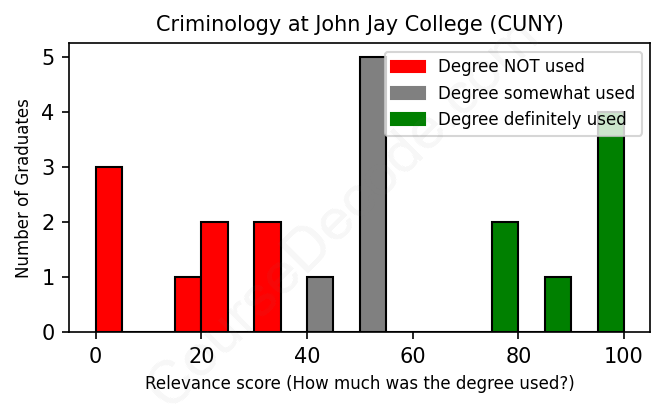
First, some facts. Of the Criminology graduates from John Jay College (CUNY) we've analyzed , here's how many have used (or NOT used) their degree in their career:

These are estimates based on AI analysis of 21 LinkedIn profiles (see below).
The verdict? Significantly below average. Overall, with an average relevance score of 50%, Criminology graduates from John Jay College (CUNY) have a much lower likelihood (-17%) of finding work in this field compared to the average graduate across all fields:
And for comparison, here's the chart for all profiles we've looked at across all degrees.
Also, after graduating, only 33% of these graduates have pursued further education other than another Bachelor's degree (such as a Masters degree or other), compared to the average across all profiles of 35%. This suggests a Bachelors degree is enough for most Criminology graduates, and it's normal to look for work straight after graduation.
See the details:
|
Relevance score: 0% We think this person has NOT gone into a career related to their degree. We think this person has NOT gone into a career related to their degree.
DEGREE INFOGraduated in 2018 from John Jay College (CUNY) with a Bachelor of Arts - BA in Criminology. Also pursued further education since (see below). JOB HISTORY SINCE GRADUATIONAssistant Manager Human Resources Queens Defenders Jan 2020 - Feb 2022 Human Resources Generalist  Mount Sinai South Nassau Feb 2022 - Sep 2022 Human Resources Business Partner  Mount Sinai South Nassau Sep 2022 - Present FURTHER DEGREES DONE SINCE GRADUATINGMaster of Science - MSStony Brook University 2019 - 2021 ABOUTNo information provided. |
The top 10 most common jobs done by the graduates we've analyzed (ranked most common to least) are:
It looks like people who graduated with a degree in Criminology from John Jay College have landed in a pretty wide variety of jobs. Some of the most common roles include positions like paralegals, case managers, police officers, and legal interns. Interestingly, many of these roles do relate back to criminology in some way, especially those involving legal assistance or criminal justice work. For instance, being a paralegal or a police officer involves applying the principles learned in criminology directly to their daily tasks, whereas jobs like billing assistant or front desk coordinator don't really connect with criminology at all. You can see how those technical or administrative roles could use more general skills, but they drift pretty far from the core focus of the criminology degree.
In general, it seems that while some graduates found their way into roles that make great use of their criminology backgrounds, like law enforcement or legal research, others have taken paths that are less relevant. The trend shows that many graduates are involved in work related to social services or advocacy, which aligns with their studies, but a significant number are also in administrative or management positions where their criminology knowledge doesn’t really play a part. So, if you're considering this field, it's clear there are various directions you can take, but not all will keep you close to the core of criminology. It's definitely worth it to think about how you want to apply your degree in the long run!
Here is a visual representation of the most common words in job titles for Criminology graduates (this is across all Criminology graduates we've analyzed, not just those who went to John Jay College (CUNY)):

Graduates from John Jay College (CUNY) with a degree in Criminology tend to have varied career trajectories, with many starting off in roles that are somewhat related to the criminal justice field. For a lot of them, their first jobs after graduating often involve roles like paralegals, case managers, or police officers. It seems like many graduates make their way into the legal realm early on, working as legal assistants or in administrative roles associated with law firms or government agencies. Others dive right into law enforcement roles or social work assignments, which can align closely with their criminology background.
If we peek five or ten years down the line, it becomes a mixed bag. Some graduates stick with the criminal justice field and rise to more senior positions, like police officers advancing to specialized roles or program managers in non-profit organizations focused on community safety. However, there are also quite a few who veer off into completely different areas, such as human resources or even hospitality management, which might not directly relate to criminology. This could suggest that while some make a solid connection to careers in criminology, others might find themselves in jobs that don’t utilize their degree as much. Overall, it's clear that John Jay grads have a wide-ranging experience—some seize opportunities in law enforcement and social services, while others explore completely different tracks as time goes on.
Honestly, a Bachelor’s degree in Criminology at John Jay College isn’t super easy, but it’s also not the hardest degree out there. It’s definitely challenging because you’ll cover a lot of ground, digging into topics like criminal law, social justice, and the workings of the criminal justice system. You’ll need to do some serious reading, research, and critical thinking, so you have to stay on top of your work. But if you’re interested in the subject and put in the effort, it can be really intriguing and rewarding. It’s on par with other social sciences in terms of difficulty, so if you’re motivated and engaged, you’ll likely find it manageable.
Most commonly, in the LinkedIn profiles we've looked at, it takes people 4 years to finish a Bachelor degree in Criminology.
From what I can see, it looks like the Criminology grads from John Jay College have had some varied career paths, but the money situation seems to be a mixed bag. Some folks, like those who went into legal or higher management roles, likely made decent salaries, especially with positions in law firms or as police officers. However, others who started off in entry-level positions or internships might still be climbing the financial ladder, which is pretty common right out of college. Overall, while some are probably doing well, it seems like many are still at the beginning of their careers and might not be raking in the big bucks just yet. So, it really depends on the specific career path they've taken!
Here is a visual representation of the most common words seen in the "about" section of LinkedIn profiles who have a Bachelor degree in Criminology (this is across all Criminology graduates we've analyzed, not just those who went to John Jay College (CUNY)). This may or may not be useful:

Here are all colleges offering a Bachelor degree in Criminology (ordered by the average relevance score of their Criminology graduates, best to worst) where we have analyzed at least 10 of their graduates:
| College | Score | Count |
|---|---|---|
 California State University, Fresno California State University, Fresno
|
67 | 20 |
 George Mason University George Mason University
|
63 | 27 |
 Arizona State University Arizona State University
|
58 | 17 |
 Missouri State University Missouri State University
|
57 | 11 |
 The Ohio State University The Ohio State University
|
56 | 16 |
 Penn State University Penn State University
|
55 | 16 |
 Florida State University Florida State University
|
54 | 60 |
 West Virginia University West Virginia University
|
51 | 20 |
 University of Maryland University of Maryland
|
51 | 11 |
 John Jay College (CUNY) John Jay College (CUNY)
|
50 | 21 |
 University of South Florida University of South Florida
|
49 | 47 |
 Central Connecticut State University Central Connecticut State University
|
49 | 13 |
 University of Florida University of Florida
|
48 | 21 |
 The University of Texas at Dallas The University of Texas at Dallas
|
48 | 10 |
 Indiana University of Pennsylvania Indiana University of Pennsylvania
|
48 | 20 |
 Mississippi State University Mississippi State University
|
46 | 10 |